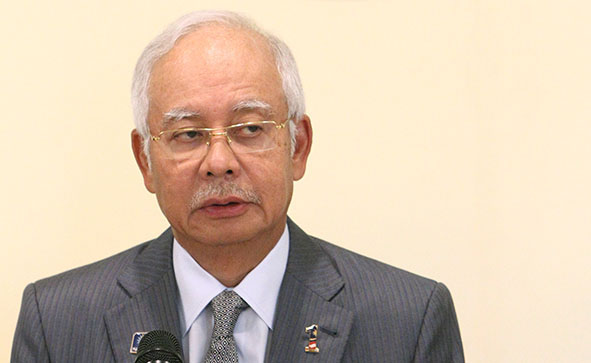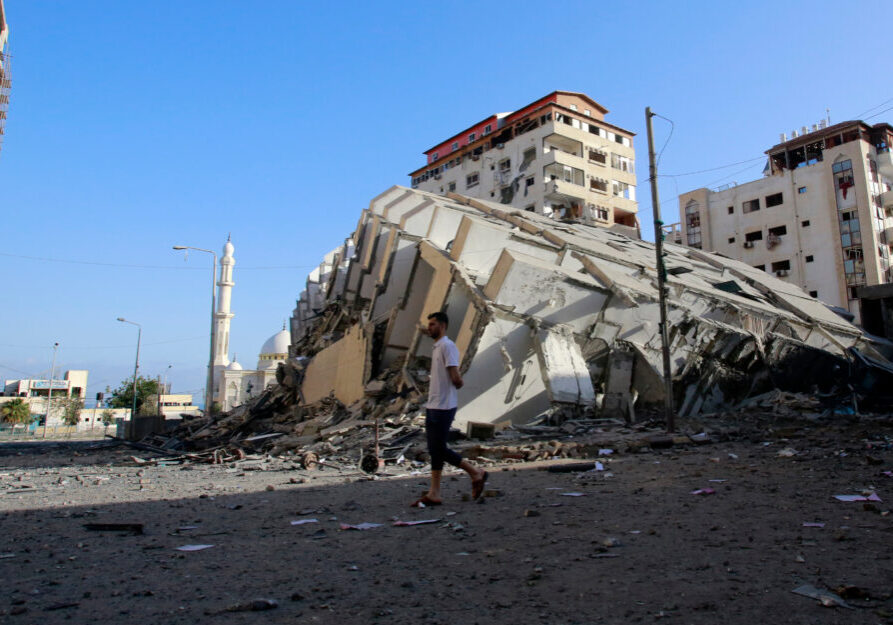Australia/Israel Review
Essay: Antisemitism as Political Tool
Mar 2, 2016 | Jon Emont

How Malaysia’s corruption scandal was blamed on the Jews
Jon Emont
Malaysia is in political and economic crisis as it has been, now, for many months, due to a huge and still unresolved corruption scandal featuring a mysterious US$700 million that was transferred into a bank account belonging to the country’s Prime Minister Najib Razak. The money arrived just before a hotly contested 2013 national election, which saw Najib’s United Malay National Organisation (UMNO) triumph by a whisker. Where this money came from is anyone’s guess. The Wall Street Journal, which first uncovered the scandal, reported that it came from the 1MDB, a Malaysian state development fund, which is now many billions of dollars in debt. Malaysia’s Attorney General’s Office, in a recent report, insisted that the money wasn’t looted from a state institution and that the US$700 million was actually a gift from the Saudi royal family.
But this, needless to say, isn’t a very good explanation. Even assuming the money did come from the Saudi royal family, why would the Prime Minister be receiving such a princely sum from foreign royalty on the eve of an election campaign? (The Attorney General’s Report did not explain why the Saudi royal family would be motivated to make such a generous donation.)
But as Aziz Kaprawi, division head of the UMNO party and deputy Transportation Minister, explained, the prince did expect something in return. “If we had lost [the 2013 election], [rival political party] DAP would be in power. DAP with its Jewish funding would control this country. Based on that, our Muslim friends in the Middle East could see the Jewish threat through DAP.” According to this account, the mysterious Arab prince had sent US$700 million to the Prime Minister’s bank account for a cause that any average Malaysian might be expected to understand, even sympathise with: to protect Malaysia from the Jews.
As this bit of Malaysian current events trivia suggests, blaming Jews for all manner of machinations, crimes, and failures is a normal part of Malaysian politics, even though very few of the country’s citizens have ever laid eyes on a Jew. While Malaysia, a Muslim-majority country of 30 million, nestled just south of Thailand, had a minuscule Jewish population that mostly emigrated decades ago, it still has a very active history of selecting leaders who make antisemitic remarks. Mahathir Mohamed, Malaysia’s Prime Minister from 1981 to 2003, gained international notoriety for his 2003 speech at the Organisation of the Islamic Conference, where he suggested that while Jews and Muslims were natural enemies, “1.3 billion Muslims cannot be defeated by a few million Jews.” He also noted that, “The Europeans killed 6 million Jews out of 12 million. But today the Jews rule the world by proxy.”
Malaysian leaders’ antisemitism has trickled down. A 2014 Anti-Defamation League (ADL) survey found that more than 60% of Malaysians exhibited antisemitic beliefs, making Malaysia the most antisemitic country surveyed in Asia outside of the Middle East. Michael Salberg, the Director of International Affairs at the ADL, said, “There is a decades long tradition of political leaders in Malaysia defaulting to antisemitic tropes to explain all kinds of social, political, and economic circumstances. It is classical scapegoating.”
The Penang Jewish Cemetery, established in 1805, is the oldest Jewish cemetery in Southeast Asia. Tucked behind gray decaying buildings in Georgetown, Penang’s capital, this small, nearly immaculate plot is tended by a Hindu Indian caretaker, Rajim, who brushes fallen coconuts from the graves.
There are about 110 graves here, marking the lives of the Jewish British colonialists and Middle Eastern Jewish traders who had settled in Penang over the centuries. Shuffling slowly along, Rajim takes me to the gravestone of Mordechai David Mordechai, buried in 2011. When Mordechai died he was, to the best of anyone’s knowledge, the last Jew on the island – quite possibly the last practising Jew in Malaysia, though in Kuala Lumpur, the capital down south, there are doubtless some foreign Jewish expat workers.
Anti-Jewish prejudice in Malaysia did not develop in response to the tiny population of Jews who lived here, but instead was tuned to the frequencies of a Muslim world that saw the rise of Israel – and the subjugation of the Palestinians – as their religion’s great humiliation. According to Daniel Chirot, Professor of International Studies at the University of Washington, since the Iraq War, global antisemitic discourse has focused on the ways that Jews supposedly use political proxies to fulfil their geopolitical goals: This idea is present in the claim that Jews are using rival political parties as proxies to dismantle the Muslim Malaysian state.
But Malaysian antisemitism cannot simply be explained by the influence of globalised Islam on the country’s politics. For one, only 60% of the country is Muslim. Indonesia, Malaysia’s neighbour, has a population that is 90% Muslim, but antisemitic beliefs are much less prevalent, according to the ADL survey, and mainstream Indonesian politicians do not have the same history of blaming their country’s problems on the Jews.
In “Malaysia: Truly Asia” the Malaysian Tourism Ministry’s campaign to woo visitors to Malaysia, advertisements promise visitors a “multicultural harmony,” as images of Buddhist temples and indigenous tribes flash past. Najib Razak, the country’s embattled Prime Minister, promotes Malaysia as a country enjoying exemplary racial harmony. But Malaysia is not actually a racial paradise, and the corruption scandal enveloping the country has only thrown this into sharper relief.
Najib’s political party, UMNO, has ruled since independence on a platform that guarantees affirmative action benefits to the Malay Muslim majority, whom the country’s constitution refers to as “sons of the soil.” Roughly 50% of Malaysia is Malay Muslim, roughly 20% is Chinese, another 7% is Indian, with indigenous and other minorities making up the rest: “Sons of the soil” – i.e., the Malay Muslim majority or plurality – receive free state education, preferential access to government jobs and a wide range of benefits from the state that are denied to the country’s ethnic minorities. This system of affirming the majority reduces non-Malay Malaysians to permanent second-class status.
Though formal state privileges accrue only to the Malay majority, the country’s ethnic Chinese dominate many sectors of the Malaysian economy. Ethnic Chinese, many of whom came to Malaysia as traders, continue to maintain extensive business networks with the Chinese mainland and are criticised by Malay nationalists for exploiting the country’s wealth for themselves. As a result, violence has periodically erupted against ethnic Chinese traders throughout Malaysia’s modern history, most notably in 1969, when 150 ethnic Chinese were murdered in race riots.
There are strong similarities between the prejudice that the Jewish “entrepreneurial minority” faced in Europe and the one faced by ethnic Chinese throughout South East Asia. In both cases, heightened senses of nationalism in host countries in the 20th century led to systematic persecution of the “entrepreneurial minority” based on accusations that the minority was abusing its host country’s generosity and exploiting locals for its community’s own benefits.
After the Wall Street Journal reported the appearance of US$700 million in the Prime Minister’s bank account, the Bersih (Clean) protest movement was jump-started in major cities throughout Malaysia. At its peak a hundred thousand yellow-shirted Bersih protesters rallied for days in Kuala Lumpur, calling for Prime Minister Najib to step down and for Malaysia’s culture of corruption to be ended. But the protesters were drawn largely from the country’s Chinese and Indian ethnic minorities, denying the protests the broad base they would need to force Najib to step down. Even the surprise appearance of Mahathir Mohamed, who served as Prime Minister for 22 years, in support of the protesters, has not permanently dented Najib’s standing.
Instead, Najib counterattacked. He shifted the issue from his own alleged corruption to that of “Malay dignity”, arguing, in a mid-September speech before crowds of pro-government “red-shirt” protesters, that Malaysia’s minorities had to learn to respect Malay institutions and leaders. “Slapped once, we [Malays] did not do anything. The second time … nothing … the third time … nothing … but the fourth time had crossed the limit. Malays also have rights,” he thundered. “The Malays will stand up when their pride is scarred, when their leader is insulted, condemned, and humiliated.”
During the tense days surrounding the Red Shirt rally there were a number of anti-Chinese provocations. Malay protesters called Chinese reporters “pigs,” an offensive slur. Red-shirt rally organisers defended the use of the term, saying that it wasn’t offensive to call ethnic Chinese “pigs,” as the Chinese dietary code had no prohibition against consuming pork. Jamal Md Yunos, the leader of a separate Malay Dignity Uprising rally, threatened to march with his men to Kuala Lumpur’s Chinatown because, according to him, the Chinese traders did not share their profits with Malaysia’s other races. When, eventually, “Malay dignity” protesters gathered in front of Chinatown they were only dispersed by police water cannon.
A red-shirt rally was threatened in Penang, the racially diverse, majority ethnic-Chinese island that once hosted Malaysia’s Jewish community. The rally ended up being called off at the last minute but not before Jamal, the Red Shirt leader, suggested that the Chinese community pay his organisation US$10 million to guarantee that there wouldn’t be any more “Malay dignity” rallies staged.
It was during this precarious period that the Malay political leader Aziz Kaprawi suggested that the political party DAP – the primary political party of the country’s ethnic Chinese, whose platform calls for ending Malay special privileges and establishing a secular state – was funded by Jews. Anthony Loke, DAP’s organising secretary, denied the charges that DAP received Jewish money, calling them a blatant diversionary tactic. “UMNO leaders are not ashamed to misuse the name of Islam and to ‘defend’ Islam in order to make halal the $700 million in Najib’s account,” he said.
The claim that DAP, a political party that represents ethnic-Chinese, takes money from Jewish interests, is effective because racist stereotypes of Jews and Chinese in Malaysia are similar. Daniel Chirot says, “The association of secret finance with Chinese is not so difficult to believe, so the association comes naturally. It’s also known that [predominantly ethnic-Chinese] Singapore and Israel are very friendly. All these things can be used.”
The other element is that Najib’s UMNO ruling party is facing challenges from the Pan-Malaysian Islamic Justice Party (PAS), an Islamist party which promotes the use of Islamic law. Despite their major philosophical differences, The Islamic Justice Party and ethnic-Chinese DAP have formed an alliance to challenge the ruling UMNO, so linking DAP with Jewish money could be an attempt to undermine the alliance. According to Daniel Chirot, “The more insecure the ruling party is the more likely it is to use antisemitism to counter the opposition.”
When I first arrived in Kuala Lumpur, I scheduled interviews with student leaders who were involved in the Bersih Movement to protest Malaysia’s culture of corruption. From the outside, Malaysia looks like it’s headed for some type of reckoning, I told them. Where did they think their country was going?
One of the students I met with was Lau Yi Leong, an ethnic Chinese Malaysian activist who had recently been arrested for protesting the government in front of Parliament. He told me that when he was released from the police, he thought his father would be angry at him for making trouble. Instead he found that his father was simply grateful that he was still alive. “If you understand my father’s background, being in Malaysia pre-merdeka [independence], when there was so much racial violence, it turns out he is justified to think like that,” Lau said. But Lau is from a younger generation where the races mingle more freely.
When Lau grew up he was determined to think of himself as Malaysian rather than Chinese, but he is now is deeply disillusioned by the state’s role in keeping the races separate. One of the things that made him realise this was falling in love with a Malay girl but not being able to maintain the relationship. “Malay girls are very pretty, we can get along with each other very well… But because of legal regulations we don’t have the opportunity… it’s impossible because of religion,” he said. Muslims in Malaysia are not allowed to convert to different religions, and inter-religious marriage is forbidden, so if he wanted to marry a Malay woman he would have to convert to Islam. He considered doing this, but decided he didn’t want to be put under the authority of the state’s Islamic enforcers.
Lau sees antisemitism as a symptom of a wider problem about racial intolerance. “For Malaysia’s progressives there is a consensus that there are good Jews and bad Jews, as with any other people. But it’s still only a small minority [of Malaysians] that understands that,” he adds. Because most Malaysians continue to believe Jews are worse than other people, he said, “If you are anti-government, the first label they will put on you is you are sponsored by Jews.”
He was determined to continue fighting for a multicultural democracy. “People think its impossible to get rid of Malay supremacy, but for me it’s possible as a long as we can persuade the majority Malays that there isn’t anything scary about giving up their special rights… I don’t hate these radical Malays, because they are a product of the regime. Everyone is born not racist. Racism is a product of the state.”
Jon Emont is a journalist based in Southeast Asia. His writing appears in Tablet, the New York Times, New Yorker, Slate, New Republic and other publications. This article is reprinted from Tablet Magazine, at tabletmag.com, the online magazine of Jewish news, ideas, and culture. © Tablet Magazine, reprinted by permission, all rights reserved.
This article is featured in this month’s Australia/Israel Review, which can be downloaded as a free App: see here for more details.
Tags: Antisemitism, Indonesia, Malaysia, Singapore






